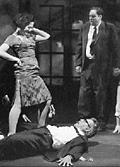THERE ARE TROUBLED marriages, and there are bad marriages. And, at the ultraviolet end of the spectrum, there are marriages to writers, if The Psychic Life of Savages is to be believed. Amy Freed’s celebrated play is a satirical send-up of the lives and miseries of a quartet of poets writing in the America of the 1950s and ’60s. Fictional versions of Sylvia Plath, Ted Hughes, Anne Sexton, and Robert Lowell (sharing only first names and some characteristics with their real-life counterparts) mate, relate, spar, and ultimately destroy each other, spouting reams of bad poetry in the process as a justification for their bad behavior.
The Psychic Life of Savages
Empty Space Theater till December 5
Ted (Eric Ray Anderson) and Sylvia’s (Betsy Schwartz) passionate relationship is initiated through poetry and, more significantly, through criticism. He trashes her undergraduate efforts, and in turn she astutely reveals his epic “Afternoon of a Slug” to be all about male impotence. After they’re married, he’s given to vituperative attacks on her ceaseless complaints about not writing, while she deconstructs his work for its misogyny. Meanwhile, Anne (Lori Larsen) and Robert (Will Marchetti) begin an extramarital affair that’s long on poetry but short on physicality, with the aged “poet laureate” hopeful that their “sensuous naps” are enough to curb his mistress’s carnal appetites.
The evening has some real pleasures, due mostly to the fine comic cast, particularly Larsen and actor Ian Bell. Larsen exults in the lazy bitchiness of the worst mother/wife ever, a woman who chooses to upstage her daughter’s 16th birthday party by staging a suicide. Bell, appearing in multiple roles, elevates the comic energy of the show whenever he’s on stage, whether as the downtrodden husband of Anne, an unctuous interviewer, or a beatnik friend of Robert’s with a barely suppressed exhibitionist streak.
But, ultimately, what’s the point of all this? Freed’s satirical swipes are broad and often wide of the mark, and her parodies of the poetry of the illustrious quartet are at best amusing and at worst bewilderingly bad. Director Leslie Swackamer plays the material as broadly as possible, which is really the only way to go. (One shudders to contemplate any company taking these people or this poetry seriously.) And for several stretches of time everything goes well. Watching Anne and Sylvia cheerfully discuss suicide options or Robert and Ted try to outdo each other’s scatological content on a radio show is genuinely funny. But the writing is all sprinting, not long distance, and while the occasional 10 or 15 minutes works well, Freed somehow or other was encouraged to write three acts of this stuff.
Maybe it’s not such a bad idea to treat these figures to a satiric basting. After all, as the 20th century weaves unsteadily out the door, the alcohol-driven excesses and “bad daddy, hungry mommy” obsessions of these writers does reveal an unpleasant weakness for self-indulgent infantilism. But if such a treatment is required, one would hope for a sharper and more perceptive attack than what Freed manages to mount.








